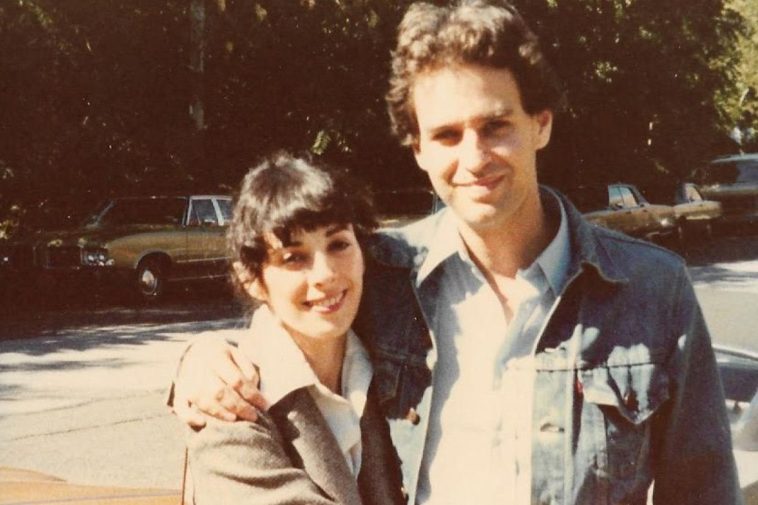I couldn’t believe the notebook wasn’t there.
My husband was on a breathing machine, unable to speak or leave his bed for three months after what was supposed to be a “walk in the park” surgery. At first he used his iPad to stream movies, read the news and write to me. “Good night sweetheart,” he’d text before going to sleep. “Good morning sweetheart,” he’d text when he woke up. And I’d write back the same. It was our way of letting each other know we were OK.
Within two months, when he was unable to concentrate enough to use technology, he started writing in a notebook ― at first legibly, then barely, until finally he could no longer write at all. The book was all I had left of our last days together.
I spoke to the attendant at the hospital security desk. “The doctor said they’d include it in the transport to the palliative care unit,” I told him. “You have to find it. Please. I’m begging you.”
“We’ve looked. It’s not here,” he replied. “We’ll keep looking, but it’s doubtful that it’ll show up.”
In the last entry, I drew a heart and, like an adolescent with a major crush, I wrote, “Ann and Steve forever.”
My husband had smiled at that. Now he and the book are gone ― at least physically.
***Steve was practically the literal boy next door. We grew up in the same Brooklyn neighborhood with two degrees of separation at most, but we didn’t know each other then.
Years later, as elementary school teachers, we attended the same workshop in a Lower East Side loft, and I noticed him among the 20 participants.
“You look familiar,” I said. He thought I was trying to pick him up. I wasn’t.
Then I was laid off from my position and transferred to another school. Steve was the first person I saw as I entered the building.
Not that guy, I thought.
You can imagine my shock when one early morning around dawn, I heard a voice in my sleep.
″Steve ― that teacher at work ― he’s so good looking, intelligent and decent,” it said.
I woke up confused. Where was this coming from? And what did it mean?
I wasn’t sure, but the next time I saw him, I found myself looking at him differently. I noticed his blue eyes. I noticed his sexy, slender physique. I noticed the passion he had while working with the kids in his class. So I asked him to have lunch with me. He refused. Then I asked him again and again, and one day he finally agreed and we went to a restaurant near our school.
After chitchatting about the children in our classes, our growing up in a working-class neighborhood, the high school we both attended ― Steve one grade behind me ― he told me, “I love the ballet ― watching the dancers, listening to the music. I find it so beautiful and inspiring.”
“Let’s go together,” I said.
Steve offered no response, and he continued eating his grilled cheese sandwich as I watched him in awe. Even the tiniest things about him ― the way his brown hair curled at the ends, the way his occasional smile lit up the room ― struck me.
The next day, I saw Steve in the school hallway and said hello.
“How are you doing?” I asked him.
“Oh, I’m depressed,” he replied. “No reason… just one of those days.”
“When I feel depressed, I try to do something and when I’m really depressed, I ask someone to do something with me,” I told him.
“There’s a Fellini film in the village I’ve been wanting to see,” he responded. “Want to join me tonight?”
I hesitated before answering. Being available at the last minute went against any sound advice anyone ever gave me about dating. But I couldn’t resist. “Yes, I’d love to,” I told him.
We had dinner before the movie at the Riviera Cafe, a popular Greenwich Village restaurant where through the huge glass windows you could easily watch people walking by as they strolled along Sixth Avenue. That’s when he told me he liked men.
“I’ve slept with two women in my life, but I prefer men,” he said.
I swallowed what I had in my mouth and reached for my glass of wine. Then I wondered if it was possible that he hadn’t been rejecting all of my invitations because of my looks or personality.
“Thanks for sharing,” I heard myself saying. “We could still be friends.”
As he shook his head yes, his hair skimmed his forehead, and I found it utterly arousing.
At the movies, someone held someone’s hand.
After the film ended, Steve asked me, “Would you like to sleep over at my apartment? I only live a few blocks from here.”
“Yes,” I replied almost instantly.
***We were married for 45 years. Steve would say we were together for 46 years, since I moved into his apartment a few weeks after that night at the movies. In all that time, we couldn’t figure out who held whose hand first. Was it Steve? Was it me? Or was it bashert ― the Yiddish word for divinely foreordained. After all, it was a voice I heard in my sleep that brought us together.
It never mattered to me if he sometimes found a man attractive. So many people were experimenting in 1976. He was bisexual and slept with men before we were married and continued to do so after we were married with my blessing until AIDS came along, and then he felt it became too dangerous. I also slept with men other than Steve. He protested that doing so might mean I would get emotionally involved with someone else, but that never happened. Steve was my best friend. My soulmate. No one could compare.
In all those years, the only thing that really bothered me was if he forgot my birthday. Since my dad was ill for most of my childhood, birthdays were always put on the back burner and rarely celebrated. As an adult, I tried to drill into Steve’s head that birthdays were important to me. Very important.
“The worst day of the year for me is your birthday,” he said every time it was approaching. It was obvious he wanted to please me, and finding something special made him incredibly anxious. But I knew he loved me more than anything, and, birthday or not, he always went out of his way to make me feel special.
***In 2020, at the height of the COVID-19 pandemic, Cassie, our beloved cocker spaniel, suddenly passed away, and we searched endlessly for a rescue dog but none were available. Everyone seemed to want a pet to ease their aloneness, which meant we were competing with throngs of people. After several months of trying, Steve finally said, “Let’s find a breeder.”
We found a breeder of mini golden-doodles just an hour away. Even though the mother-to-be, Lola, hadn’t become pregnant yet, her owner still wanted a large deposit. It seemed crazy, but Steve said, “Let’s do it.”
Soon Lola was pregnant, and the breeder posted photos on Instagram of her progress.
By that point, Steve picked up several different strains of pneumonia and was hospitalized and hooked up to a ventilator. I’d watched him conquer so many illnesses over the years ― from throat cancer to an aorta valve replacement. This time felt different.
Finally, Lola’s puppies were born, and amid masked nurses and doctors, we looked at photos of her nine puppies and kept tabs on them as they grew. Their collars were each a different color, and they already had names, so we could easily identify them.
Steve showed the photos of the cute apricot and red puppies with streaks of white on their foreheads, necks or paws to his nurse and doctor.
“Romeo, the one with a white heart on his forehead. That’s the one for us,” Steve wrote in his notebook.
Then the next day, after a night of pain and not sleeping, he scribbled, “Am I dying?”
“No, you’re not dying,” I told him, trying to comfort him and relieve his anxiety. “They’re treating you. Those IV’s hooked up to your veins are powerful antibodies. First they cure the pneumonia and then get you off of the vent. Just hang in there. Please.”
I wanted so much to believe what I was saying was true that I convinced myself Steve would pull through and refused to let a negative thought enter my mind.
Romeo was now 4 weeks old, and Steve’s writing was becoming less and less legible. Still, he smiled when I showed him the latest video clip of the puppy playing with his litter mates.
Two days later, Steve was sleeping all the time.
“The medicines aren’t working,” his doctor told me. “It’s a very rare pneumonia. I think you should sign a Do Not Resuscitate directive, Ann.”
“My husband always told me to keep him alive no matter what,” I responded.
His internist of many years talked to me, too.
“Ann, Steve was not only my patient, but he also became my friend. There’s nothing more anyone can do,” he said. “His kidneys are shutting down. You don’t want him to suffer more than he already has. For his sake, please sign it.”
“OK, OK.” I finally said. “Just give me the form.”
And that was it ― my permission to give up. No more fluids when his blood pressure dropped. No more monitoring devices hooked up across his body. No more blood thinners, CAT scans or blood tests that caused black-and-blue bruises to spread all over his arms.
I was terrified. How could I live without him? Although part of me was relieved that after 11 years of constantly battling different illnesses (and my heart breaking with each new crisis), Steve would be at peace, I was angry. Why him? Why me? The last three months had been absolute torture, and now he was going to die. I didn’t know how I would survive witnessing it, but I was certain he didn’t deserve what we were now facing.
After I agreed to stop treating Steve, he was transferred to the palliative care unit. “Tomorrow, we’ll turn off the vent. You can sit with him until he passes,” the nurse said.
Instead, at 2 a.m., a nurse called. Steve had passed away. My immediate thought was thank you for sparing me the pain of watching you take your last breath.
Then I started throwing up and heaved when there was nothing left to expunge.
A few hours later, sitting at my computer still in complete shock, I heard a ping, and an email from the breeder popped up.
“Let’s talk. We’re ready to decide which puppy is right for you,” she wrote.
I told her I wanted Romeo.
“I want to set up a day for you to meet him,” she responded. “How’s May 12?”
May 12 was my birthday. I believe ― without a doubt ― it was Steve’s birthday present to me. He had found the perfect gift: a companion to help me begin my new life without him and a new love to help fill the giant hole in my heart.
Romeo will be ready for me to pick up on June 27, our wedding anniversary.
Throughout our marriage, I kept my maiden name, but the puppy’s surname will officially be Steve’s last name and my last name hyphenated in honor of the life we shared.
Our relationship might have been unexpected and unconventional. I could have walked away when Steve told me he was mostly interested in men, but I didn’t. I felt something beautiful and true blossoming, and I stayed. And I kept on staying for nearly 50 years.
Over those years, we became inseparable. Steve taught me to have faith in myself and do more than I ever thought possible. I taught him to have fun and be open to adventures. We changed jobs many times, we traveled and bought a house in the country and planted flowers. No matter what happened or what came our way, we were there for each other because that’s what life is about: being there for someone you love through everything.
Hospital security never located Steve’s notebook, but it no longer matters. “Steve and Ann forever” is imprinted in my heart. And now Romeo, with his white heart on his forehead, will be by my side.
Ann Gorewitz lives in New York City. She is currently working on a memoir, “Dog Therapy: Loving and Losing Cassie,” about the healing effect of loving a dog and the much-needed comfort and support her cocker spaniel gave her during her late husband Steve’s illnesses.
This article originally appeared on HuffPost in June 2021 and was updated in May 2024.





GIPHY App Key not set. Please check settings